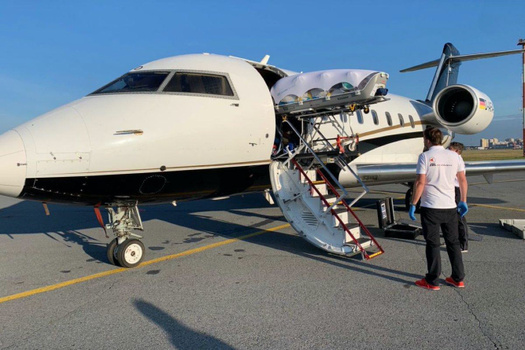
Russian police officials make false claims about Anti-Corruption Foundation employee evading questioning
Мы рассказываем честно не только про войну. Скачайте приложение.
Maria Pevchikh was among the group of six people who accompanied opposition figure and anti-corruption activist Alexey Navalny on the trip to Siberia that ended with his poisoning. Now, the Transit Police Department for Russia’s Siberian Federal District is claiming that Maria Pevchikh — or as they’ve mistakenly called her, “Marina” Pevchikh — is refusing to testify. The department is carrying out a preliminary inquiry into Navalny’s hospitalization in Omsk (Russian police officials have yet to open an actual case over the attack on Navalny).
“Pevchikh, one of [the people] who were with Navalny, [who] resides permanently in Great Britain, avoided making a statement on August 20. According to the investigation, on August 22, the citizen in question flew to Germany, as a result it wasn’t possible to get a statement from her. Her whereabouts are currently being established,” transit police officials said in a statement.
The other five people who accompanied Navalny have been questioned. This includes Vladlen Los, Georgy Alburnov, and Ilya Pakhomov — employees of Navalny’s non-profit, the Anti-Corruption Foundation, — as well as his press secretary Kira Yarmysh and cameraman Pavel Zelensky. The transit police are also looking to establish the whereabouts of other passengers who were on the same flight from Tomsk to Moscow as Navalny.
Pro-Kremlin media accuse Pevchikh of ‘involvement in Navalny’s poisoning’
On September 7, the pro-Kremlin outlet Pravda.ru reported, citing an anonymous source, that Pevchikh accompanied Navalny on his trip to Siberia “on the instructions of FBK director Vladimir Ashurkov,” who allegedly came in conflict with Navalny shortly beforehand, over his decision to dissolve the FBK. Pravda.ru said Pevchikh was “likely Navalny’s poisoner,” claiming that she stayed in the same hotel room as him, but wasn’t with him on the plane from Tomsk to Moscow; instead, she drove to Novosibirsk and then flew from there to Omsk. In addition, Pravda.ru called Pevchikh “a woman with an opaque life story and very interesting facts in her biography.”
Kremlin-linked catering magnate Evgeny Prigozhin also made allegations about Pevchikh’s possible involvement in Navalny’s poisoning via statements from the press service of his company, Concord (however, the company also claims that Navalny’s press secretary Kira Yarmysh was involved in poisoning him). The pro-government websites Tsarygrad TV and Putin News made similar claims.
In fact, police officials made no attempt to contact Maria Pevchikh
According to Meduza’s research, Maria Pevchikh studied sociology at Moscow State University and political science at the London School of Economics, concurrently. She has worked for the FBK since 2011, and now leads the foundation’s research department. Pevchikh lives in London, but she travels to Russia often. Her job includes gathering materials and writing scripts for the FBK’s investigations.
Prior to Navalny’s poisoning, Pevchikh was with him in Tomsk, where his team was filming new video investigations. According to Meduza’s research, all of the group members stayed in separate rooms at the Xander Hotel. The investigation, Meduza found out, went relatively smoothly.
When Navalny left Tomsk, a few of the group members stayed behind, including Maria Pevchikh. After the news broke that Navalny had been poisoned, they all went to Omsk. Meduza found out that Maria Pevchikh was allowed to leave Russia without any difficulties. Russia’s law enforcement agencies have made no attempt to contact her over the past two weeks, even though her Russian phone is always on. She was never called in for questioning or interrogation, and hasn’t received a summons. Pevchikh told Meduza that she will be prepared to give detailed comments at a later date.
Transit police officials plan to seek help from Germany
The Transit Police Department for Russia’s Siberian Federal District reports that in addition to questioning Navalny’s companions, the preliminary investigation has established the route he travelled, as well as the places he visited and stayed in Tomsk and the Tomsk Region. This includes the Xander Hotel, the restaurant Velvet, a rental apartment, where Navalny’s supporters held a working meeting, and the Vienna Cafe in the Tomsk Airport. According to police officials, these are the places where Navalny ate and drank, “including wine and alcoholic cocktails.”
Given medical reports that Navalny has been brought out of his coma, the investigative unit of the transit police is preparing a request for legal assistance from Germany. The request includes an application to involve Russia’s state investigators in the German investigation of Navalny’s case — seeking in particular “the opportunity to ask clarifying and additional questions while retrieving statements.”
Text by Olga Korelina and Svetlana Reiter
Translation by Eilish Hart
(1) Navalny’s poisoning
Navalny was poisoned on August 20. He spent two days in a hospital in Omsk and was then transferred to Germany for further treatment. On September 2, German officials confirmed that traces of a Novichok-type poison were found in Navalny’s test samples. The German weekly Die Zeit reported that the Russian intelligence services had to be involved in the poisoning — they allegedly used a new, more dangerous type of Novichok, which only could have been developed in a military lab. Russia maintains that the doctors who treated Navalny in Omsk didn’t find any traces of poison in his system.
(2) Vladimir Ashurkov
The former director of Group Portfolio Management Control at Alfa Group Consortium. In 2012, he became one of the FBK’s first public sponsors and took over as the non-profit’s executive director. In 2015, Ashurkov received political asylum in the United Kingdom after a criminal case was launched against him in Russia.